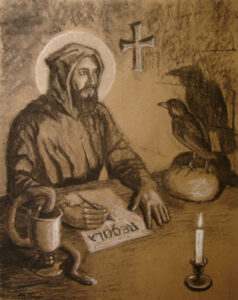Avoid haste and want of control of bodily movements. The interior man, no matter how burdened with work or pressed for time, is never in a hurry. He is swift and expeditious in all he does, but never rushes; and by a jealous watchfulness over odd moments, “gathering up the fragments” of a full day “that none of them may be lost,” he finds time for all things. He knows that the Almighty is never in a hurry; that the great works of God in nature as in the soul are done silently and calmly, and that there is much wisdom in the old monastic saying, “The man who rushes will never run to perfection.”
COMMENT: In today’s quote, Fr Doyle speaks to us about the importance of balance and moderation. Even when busy we should not be in an excessive hurry, but always maintain our equilibrium. Perhaps this is one area where Fr Doyle had to struggle. He was naturally hot tempered and extraordinarily zealous. However, it is clear that by the end of his life he had mastered this aspect of his temperament. He was a source of peace and tranquillity for others. By all accounts, he remained serene and peaceful right to the very end. This man, who had a nervous breakdown slightly more than 20 years before, was now a rock of strength and peace for others.
Today is the feast of St Benedict, one of the patron saints of Europe and indeed the Father of the West. Monks following his rule were instrumental in saving western civilisation after the fall of the Roman empire. By preserving the heritage of classical learning, and indeed by preserving the faith itself within their monasteries, the Benedictine monks played a pivotal role in the development of Christendom and indeed of western civilisation itself. We owe many historical inventions and advances in learning, as well as practical developments in agriculture, engineering and even brewing to the dedication and application of the Benedictines.
The motto of the Benedictine order is Pax – Peace. The Rule of St Benedict is renowned for its balance and moderation, especially compared to the harsher rule of life adopted by the Eastern monks. St Benedict tells us that it is important that people in the house of God (and by extension in the Christian family) should not be vexed or anxious, for this destroys the peace which so readily assists in the growth of holiness. Commenting on the Rule of St Benedict, Pope Benedict said:
For its moderation, humanity and sober discernment between the essential and the secondary in spiritual life, his Rule has retained its illuminating power even to today.
We live in an increasingly frenetic world. The technology that was supposed to alleviate our work has often only served to complicate our lives further. Let us pray that we may acquire the moderation and balance that both Fr Doyle and St Benedict speak of, and that this spiritual equilibrium will better equip us to serve God and our neighbour more effectively.

